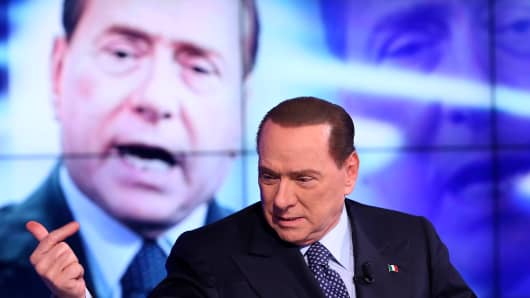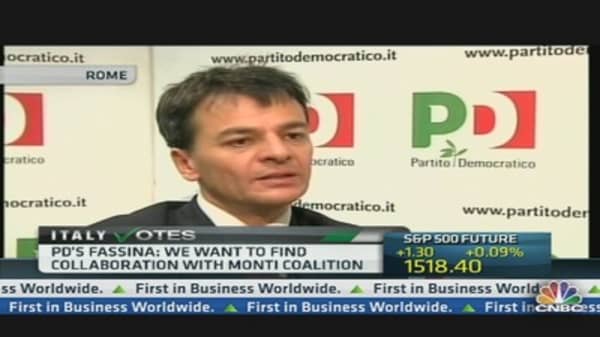As Italian elections approach and the gap between the right and left-wing candidates closes, analysts fear that the tight political race could result in a hung parliament, an outcome that could easily derail Italy's already-fragile economy.
"The Italian elections remain a significant risk event...we cannot exclude surprises in the last week of the campaign," research analysts at Credit Suisse said in a research note.
According to a median of polls published before February 9 when a blackout period for surveys began, the center-left leader Pier Luigi Bersani and his Democratic Party (PD) have a 5.7-percentage-point lead over Berlusconi's revamped Popolo della Liberta' (PDL). They are followed by comedian Beppe Grillo's 5-Star Movemen t, seen by many as a protest vote, and technocrat leader Mario Monti's bloc in fourth place.
Credit Suisse's analysts remarked that the comeback in the polls of billionaire Berlusconi's party and the rise of the protest vote (around 30 percent of potential voters remained undecided or planned to abstain) had created an air of uncertainty before elections due on February 24 and 25.
"In our view, the most likely outcome remains a governing coalition between the center-left led by Pier Luigi Bersani and the center led by Mario Monti…however, there are several alternatives and sub-scenarios that cannot be dismissed," the analysts said.
A Match Made in Heaven?
In particular, the risk of no party winning an outright majority or the formation of a broad coalition could be unsettling for markets, at least in the short term, given that it would basically mean a hung parliament scenario," Credit Suisse said.
"Even if some components of the 'anti-system' parties could join the coalition that has won a relative majority, that solution would imply a weak and heterogeneous government. The probability of new elections within a year or two would be relatively high," the note added.
Despite their differences over labor-market reform, pro-European Bersani has said his PD party would form a coalition with technocrat Monti, whose popularity in the polls has fallen since his government introduced tough austerity policies to tackle a 120 percent debt- to-GDP ratio.
(Read More: Italy Has Gained Respect)
Stefano Fassana, economic advisor in Bersani's party, told CNBC that the most important thing for the next government was to implement reforms, a strategy that chimes with Mario Monti's manifesto.
"The problem for the next government is not one of survival, it's one of implementing reforms. We want to have a credible and able government able to do this", he told CNBC in Rome, ruling out forming a coalition with the extreme left.





